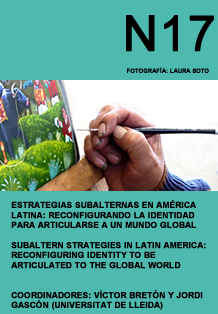Resumen
Resumen.
A pesar de no ser descrito como tal, el negocio de las algas pardas en Chile encaja en las definiciones de extractivismo usuales: se trata de una actividad basada en la remoción intensiva de un recurso natural, actividad centrada en la exportación sin procesar del recurso y cuyo control está en manos de capitales extranjeros. Por lo demás, el funcionamiento del comercio de algas concuerda en aspectos más concretos con otros extractivismos: el negocio se estructura de manera jerárquica y opaca, con una mezcla de formalidad-informalidad (con regulaciones estrictas, pero subcontratación de la mano de obra, por ejemplo) y conlleva beneficios muy desiguales y un desarrollo más que cuestionable. Como en otros casos, también la actividad alguera acarrea efectos perjudiciales no sólo en lo ecológico sino también en lo social (agotamiento de los recursos y de las comunidades, entre otros). Todo ello se ilustra con un caso etnografiado, una localidad de la IV Región que ha sufrido una serie de extractivismos a lo largo de su historia y ha reactualizado viejas dinámicas y patrones con este nuevo recurso valorizado.
Palabras clave.
Extractivismo; Economía política; Algas; Pesca artesanal; Co-manejo; Chile.
Abstract.
Despite not being described as such, the brown seaweed business in Chile fits into the usual definitions of extractivism: it is an activity based on the intensive removal of a natural resource, an activity centred on the unprocessed export of the resource and whose control is in the hands of foreign capital. Moreover, the functioning of this trade agrees in more concrete aspects with other extractivisms: the business is structured in a hierarchical and dull manner, with a mixture of formality-informality (with strict regulations but subcontracting of labor, for example) and entails very unequal benefits and a more than questionable development. As in other cases, also the seaweed industry entails harmful effects not only in the ecological but also in the social (depletion of resources and communities, among others). All this is illustrated with an ethnographic case, a locality of the IV Region that has suffered a series of extractivisms throughout its history and has reactualized old dynamics and patterns with this new valued resource.
Key Words.
Extractivism; Political Economy; Seaweeds; Artisanal fishery; Co-management; Chile.
Citas
Acosta, Alberto (2011) “Extractivismo y neoextractivismo: Dos caras de la misma maldición”. En Miriam Lang y Dunia Mokrani (coords.) Más allá del desarrollo, Quito: Fund. Rosa Luxemburg, Abya-Yala, pp. 83-117.
Araos, Francisco (2006) Irse a la orilla. Una aproximación etnográfica a los Marseros de algas de Cardenal Caro, Santiago de Chile: Universidad de Chile, http://repositorio.uchile.cl/handle /2250/106529 [Consultado el 29 de marzo de 2019].
Babidge, Sally y Belfrage, Madeleine (2017) "Failing forward: A case study in neoliberalism and abandonment in Calama". Cultural Dynamics 29(4), pp. 235-254.
Brass, Tom (1990) “The Latin American enganche system: Some revisionist reinterpretations revisited”. Slavery & Abolition: A Journal of Slave and Post-Slave Studies 11(1), pp. 74-103.
Bunker, Stephen (1984) “Modes of Extraction, Unequal Exchange, and the Progressive Underdevelopment of an Extreme Periphery: The Brazilian Amazon, 1600-1980”. American Journal of Sociology 89(5), pp. 1017-1064.
Gago, Verónica y Mezzadra, Sandro (2015) "Para una crítica de las operaciones extractivas del capital. Patrón de acumulación y luchas sociales en el tiempo de la financiarización". Nueva Sociedad 255, http://nuso.org/media/articles/downloads/4091_1.pdf [Consultado el 8 de marzo de 2019].
Gelcich et al. (2014) "Towards polycentric governance of small-scale fisheries: insights from the new 'Management Plans' policy in Chile". Aquatic Conservation: Marine and Freshwater Ecosystems 24, pp. 575-581.
Gudynas, Eduardo (2009) "Dies tesis urgentes sobre el nuevo extractivismo. Contextos y demandas bajo el progresismo sudamericano actual". En Jürgen Schuldt et al. Extractivismo, Política y Sociedad, Quito: CAAP, CLAES, Fund. Rosa Luxemburg, pp. 187-225.
Gudynas, Eduardo (2015) Extractivismos. Ecología, economía y política de un modo de entender el desarrollo y la Naturaleza. Cochabamba: CEDIB.
Han, Clara (2012) Life in Debt. Times of Care and Violence in Neoliberal Chile. Berkeley: University of California Press.
Harvey, David (2007) Breve historia del neoliberalismo. Madrid: Akal.
Latta, Alex y Cid Aguayo, Beatriz (2012) "Testing the Limits. Neoliberal Ecologies from Pinochet to Bachelet". Latin American Perspectives 39(4), pp. 163-180.
Sanyal, Kalyan (2013) Rethinking Capitalist Development. Primitive Accumulation, Governmentality and Post-colonial Capitalism. London: Routledge.
Svampa, Maristella y Viale, Enrique (2015) Maldesarrollo. La Argentina del extractivismo y el despojo. Madrid: Katz.
Vaccaro, I.; Harper, K. y Murray, S. (2016) “The Anthropology of Postindustrialism: Ethnographies of Disconnection”. En Ismael Vaccaro, Krista Harper y Seth Murray (coords.) The Anthropology of Postindustrialism: Ethnographies of Disconnection. New York: Routledge, pp. 1-20.
Varas, Katerina A. (2011) Algas pardas como recurso objetivo de las áreas de manejo y explotación de recursos bentónicos: percepciones y toma de decisiones en siete organizaciones de pescadores artesanales de Atacama y Coquimbo. Tesis de Grado en Biología Marina, Universidad Católica del Norte.
Vásquez, Julio et al. (2014) "Economic valuation of kelp forests in northern Chile: values of goods and services of the ecosystem". Journal of Applied Phycology 26, pp. 1081-1088.
Vásquez, Julio (2016) "The fishery of brown seaweed in Chile". En Heimo Mikkola (coord.) Fisheries and Aquaculture in the Modern World, In Tech: pp. 123-141, https://www.intechopen.com/books/fisheries-and-aquaculture-in-the-modern-world [consultado el 08 de marzo de 2019].
Ye, Jingzhong et al. (2019) “The incursions of extractivism: moving from dispersed places to global capitalism”. The Journal of Peasant Studies, preprint. https://doi.org/10.1080/03066150.2018.1559834 [consultado el 08 de marzo de 2019].
La Universidad de Sevilla se reserva todos los derechos sobre el contenido de las revistas científicas tuteladas por su editorial. Los respectivos textos no pueden ser utilizados, distribuirse, comercializarse, reproducirse o transmitirse por ningún procedimiento informático, electrónico o mecánico con ánimo de lucro, directo o indirecto, ni tampoco incluirse en repositorios ajenos, sin permiso escrito de la Editorial Universidad de Sevilla. La distribución de estas obras derivadas se debe hacer con una licencia igual a la que regula la obra original y podrán ser usados y citados para fines científicos y referenciados con transformación para usos académicos, indicándose en todo caso la autoría y fuente, pudiendo para ello remitir al correspondiente enlace URL de Internet
Esta obra está bajo https://creativecommons.org/licenses/by-nc-sa/4.0/deed.es

